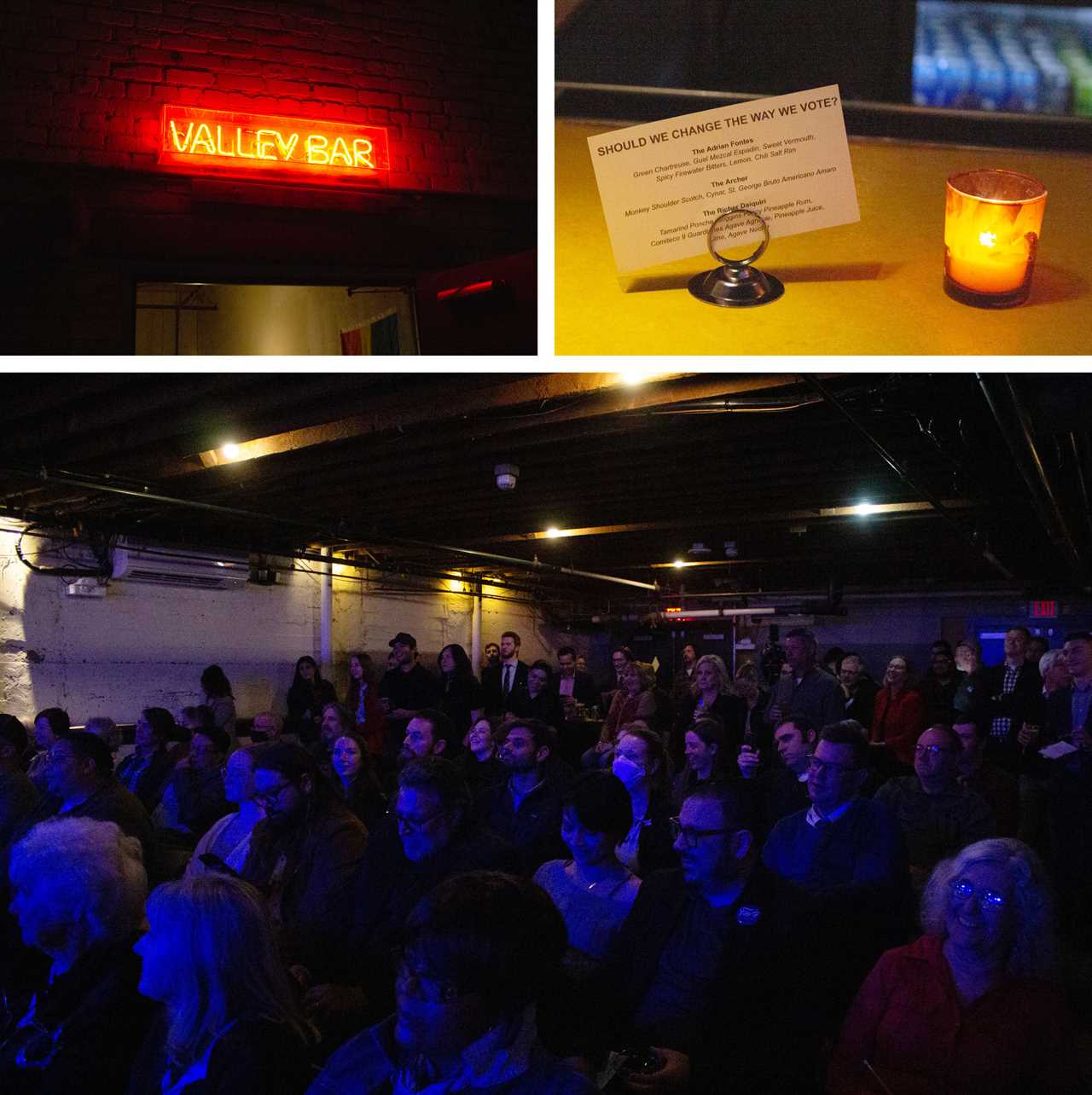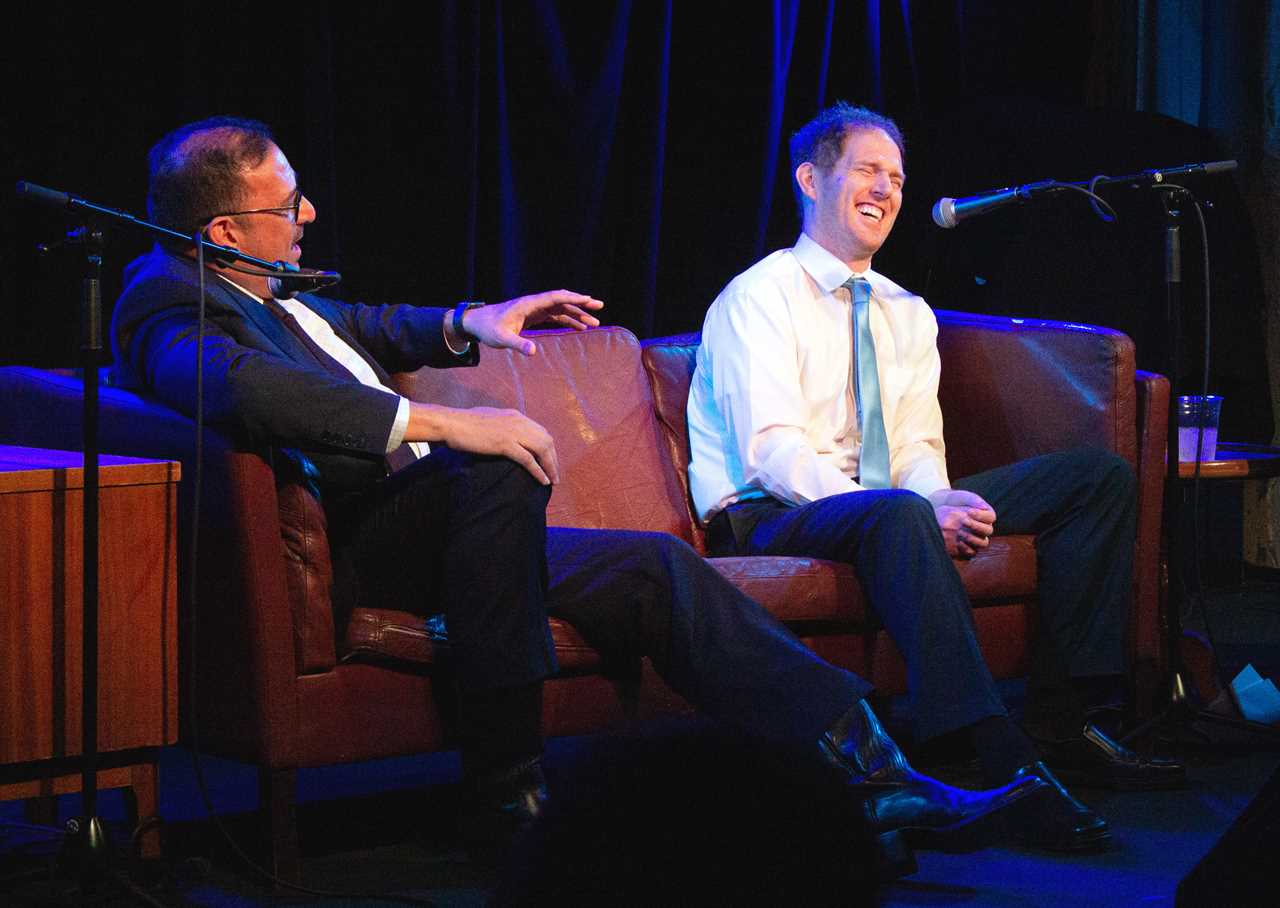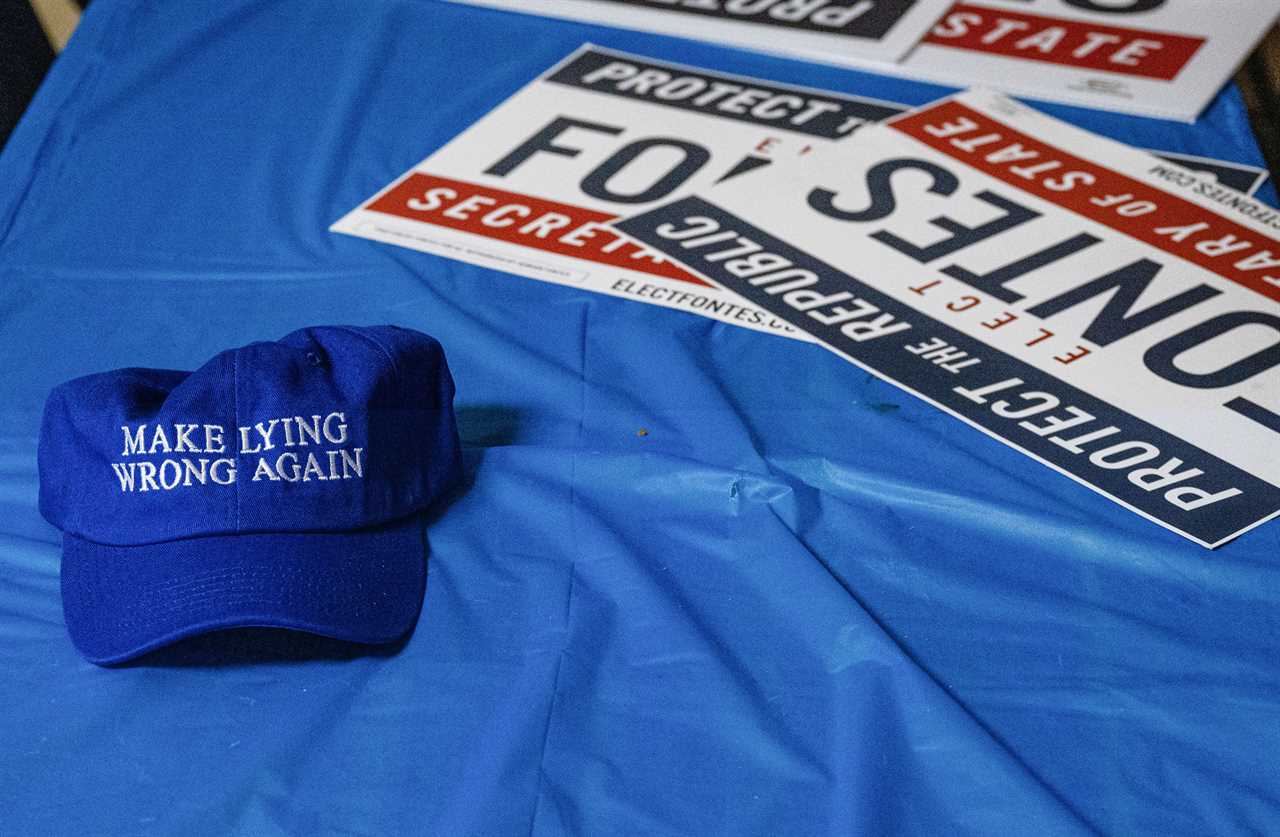
PHOENIX — Election officials don’t normally draw standing-room-only crowds in basement music halls. But the noise around elections in Arizona is anything but normal right now.
Roughly 120 people crammed into Valley Bar — entering through the back alley, down a flight of stairs into a dimly-lit venue stuffed with rows of folding chairs — in early February to hear recently-elected Secretary of State Adrian Fontes, a Democrat, and Maricopa County Stephen Richer, a Republican, debate proposals to change how the state votes and counts its ballots. Recent close elections in the state have seen top-of-the-ticket races uncalled for days, an issue they’re eager to address.
Even more surprising than Fontes and Richer drawing a crowd to discuss election administration amid local Super Bowl festivities and a major golf tournament is the fact the two men were sharing a stage at all.
It’s been little more than two years since they faced off in a bitter, acrimonious election, with Richer ultimately unseating then-Maricopa Recorder Fontes in November 2020 to become the chief election official for the country’s fourth-largest county. Richer was sharply critical of how Fontes was running the county office, alleging he was overextending the role beyond that of a neutral administrator.
But Richer voted for Fontes in 2022 to be secretary of state, he told POLITICO in an interview the day before the event. “If you would have told me that two years ago, I would have been very confused as to what had happened,” Richer said. “But then again, what's happened over the last two years is very confusing to me, and is very exceptional.”

“What’s happened” is that Arizona became ground zero for conspiracy theories, mainly fed by former President Donald Trump and his allies, that a vast underground cabal was working to steal elections. Arizona was one of the handful of states where Trump unsuccessfully tried to overturn the results in 2020. But the movement has metastasized far beyond that — into a GOP-led review of Maricopa’s votes denounced by the Republican-controlled county board of supervisors, and then a Republican ticket in 2022 that largely subscribed to the “stolen election” mythology, including Mark Finchem, the GOP secretary of state nominee Fontes defeated. Those midterms saw resurfaced and unsubstantiated allegations of intentional malfeasance in elections, as well as a failed attempt by GOP gubernatorial candidate Kari Lake and others to get the results overturned.
Now, the top election officials in Arizona and its biggest county are preparing to battle the same forces in 2024, amid the pressure and scrutiny of a presidential race. The cascade of attacks on Arizona’s democratic system has seen Fontes and Richer make peace over their differences — to a degree. It’s one of the most striking examples of one-time political foes setting aside past rivalries to band together over the big question of democracy.
“It’s not often that you find yourself in a position to really evolve a lot on the way that you see someone,” Fontes said at the event at the bar.
“There was a point in time … I genuinely, genuinely wished him great ill. And he deserved it,” he said, to laughter from the crowd.

Two very different men
The two offices have fundamentally different roles. Fontes is responsible for helping set statewide election policies and run training for local election officials, while Richer splits responsibilities for the county with the board of supervisors, conducting many of the day-to-day duties of running elections and interacting with voters.
But Maricopa is no ordinary county. It accounts for over 60 percent of Arizona’s registered voters, and both offices must work closely together to prepare for next year.
The relationship between secretary of state and Maricopa recorder is “almost a marriage that you have to go through,” said Helen Purcell, who served as Maricopa recorder for decades before Fontes defeated her in 2016. “You are responsible for different things,” she said, noting that she had worked very closely with secretaries of state on implementing the state’s voter registration system and the state manual setting election policy.
Fontes and Richer, both attorneys by trade, are temperamentally almost polar opposites.
Fontes is a gregarious and charming Marine Corps veteran. He has a big personality and is eager to be at the front of a political movement — or a fight. That tendency has triggered chatter among Arizona’s political class about his long-term political aspirations. When asked to describe Fontes, Richer described him as “brash, he’s charismatic, he’s sort of larger than life,” before ruefully noting that Fontes is also a “damn good singer” as well.
Fontes, a mariachi performer who was a lead male vocalist during his time at Arizona State, joked in an interview that he would “absolutely wipe the floor with” Richer in a karaoke contest.

Richer, by contrast, is far more bookish. The recorder is a “measure twice, cut once” data guy who regularly references the Harry Potter book series. In a past life, he was a self-described “movement conservative” think-tanker and one-time investor in a bar and a frozen yogurt shop in Washington — both now shuttered. He’s prone to authoring detailed reports to try to get his point across, including his most recent in January: A 28-page missive on changes he thinks should be made to state election law.
Fontes’ assessment of Richer?: “He’s an earnest man” who has an “interesting and quirky sense of humor” and is willing to listen to all comers.
“They’re very entertaining, very personable, very charming. Both have got their own style of charisma,” said John Giles, the Republican mayor of Mesa, Ariz., who endorsed Fontes for secretary of state and served on his transition team. “But they also don’t belong in the same universe. … When I think of Stephen, I think of Woody Allen, and when I think of Adrian Fontes, I think of Foghorn Leghorn.”
“They have no choice but to figure out a way together. They’re both reasonable, decent people,” said Alex Gulotta, the Arizona director of the voter advocacy group All Voting is Local, who also served on the Fontes transition team and works regularly with both offices. “Reasonable, decent people, whether they had a contentious race or not, are going to put their best foot forward.”

‘The bromance only goes so far’
That’s not to suggest that they are best friends — on stage, Fontes noted that “the bromance only goes so far” — or that they don’t have deep, ideological disagreements over how elections should actually be administered.
Richer said that Beau Lane, a more “Main Street”-style Republican who lost to Finchem in last year’s GOP secretary of state primary, would have had his support in the general election against Fontes, had he won the party’s nomination. Richer added that he’s “happily” told Fontes as much.
And Fontes still bristles at the criticisms leveled in a 2019 “audit” Richer conducted for the state GOP following the 2018 midterms. (Broadly, Richer’s report didn’t allege that Fontes broke the law, but Richer argued at the time “it raises some serious questions” about the office.)
On stage, they told good-natured jokes about how close the 2020 election between the two was. They also disagreed on some of the recent proposals that Richer laid out to try to speed up the reporting of unofficial election results in Arizona, which typically takes days to resolve. The main sticking point was Richer’s proposal to move up the deadline for people to drop off mail ballots in person, a convenience for many voters that also adds processing time to actually count the votes. Voters can currently drop off mail ballots in person up to Election Day, but Richer proposed moving up the deadline to the Friday before an election.
But what has bound them, both say, is respect for the voters’ will in elections at the end of the day, and their staunch opposition to the lies of stolen elections in the state.
“I think it starts with the fact that we’re both attorneys, and we understand compartmentalizing political fights, or in our case legal fights, from personal relationships,” Fontes said. “A fool is a lawyer who stays angry after the gavel drops.”
Fontes also added that Richer was not the only Republican who crossed the aisle to back him in 2022 against Finchem, who did not respond to an interview request. In addition to Republican officeholders like Giles or Richer, the now-secretary of state said that he was also able to attract some “big, big Republican money people,” who are “trying to figure out a way to get rid of the crazy, or at least pull the crazy away from winning primaries.”

A test of that will be the 2024 elections. In addition to another high-profile Senate race in the state, Richer could also be on the ballot himself. He is up for reelection next year, and should he run, he would likely face not only a competitive general election but a primary challenge from the MAGA wing of the Republican Party, with which he has clashed for almost the entirety of his time in office. Richer has faced censures from both the state and county Republican parties.
Richer told POLITICO he was undecided on whether he would run again, saying he’s set a “vague April/May deciding point for myself.”
He described thinking through the process of running again: “More than ‘could you win,’ but ‘that just doesn’t sound fun,’ going through the process.”
But, Richer added, “On the other hand, the position has never been more meaningful. We are at a moment in American history where this county — and this office — are playing a significant role.”
----------------------------------------
By: Zach Montellaro
Title: The bipartisan odd couple banding together to fight election deniers in Arizona
Sourced From: www.politico.com/news/2023/02/21/election-deniers-arizona-adrian-fontes-00083505
Published Date: Tue, 21 Feb 2023 04:30:00 EST
Did you miss our previous article...
https://consumernewsnetwork.com/politics-us/joe-bidens-simple-but-hard-ukrainian-question






